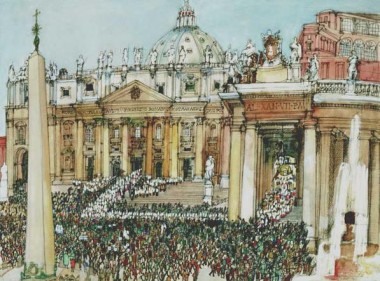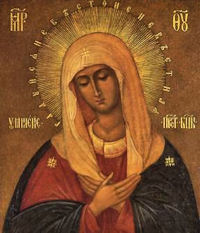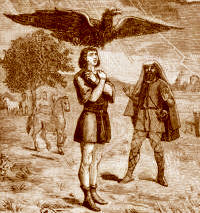Where to Seek the Truth (Part II of II)
June 8, 2015 by Fr. Bartunek
Here is the question we are examining:
Dear Father John, I want to learn more about God but I don’t know how to tell good teaching from bad. Where can I find out the truth?
Whom to Listen to
The most important criterion to follow as we make those choices is Christ’s own: “Whoever listens to you listens to me. Whoever rejects you rejects me” (Luke 10:16). Jesus has given to the world a teacher authorized to speak in his name, and he has promised to protect that teacher from error in all things regarding faith (what God has revealed about himself, his creation, and his plan of salvation) and morals (what God has revealed about how we must live in order to reach spiritual maturity). This teacher is his Church, the preserver and explainer of the gospel message as it comes to us, especially through sacred Scripture (the Bible) and sacred tradition (everything else the apostles received through the Holy Spirit and passed on to the Church).
The Church’s authentic teaching office is called her Magisterium, and its dependability is guaranteed through the Holy Spirit’s guidance of Christ’s vicar on earth, the Pope, and the bishops who teach in communion with him. As members of the Church, we all share in what theologians call the sensus fidei, or “supernatural sense of faith,” by which revelation is maintained and understood down through the ages, but the Magisterium has a special role to play in that process. Here is how the Catechism of the Catholic Church (CCC) explains it:
In order to preserve the Church in the purity of the faith handed on by the apostles, Christ who is the Truth willed to confer on her a share in his own infallibility. By a “supernatural sense of faith” the People of God, under the guidance of the Church’s living Magisterium, “unfailingly adheres to this faith” (CCC, paragraph 889).
As we actively seek to expand and deepen our knowledge of God and his plan of salvation, the Magisterium provides clear reference points, firm anchors, and healthy parameters around which we can freely and confidently grow in our knowledge of the truth. These come primarily in the form of instructions from popes and bishops (such as encyclicals and the Catechism) and are explained by dependable Catholic sources (homilies, books, articles) that apply them to the different circumstances of life. Without those reference points, anchors, and parameters, we would return to the hesitant, fearful exploration that characterizes so many Christ-less paradigms. Without them, we could easily fall into seductive but destructive errors–for example, the heresies that have caused so many wounds throughout the centuries, the post-modern rationalizations of abortion and euthanasia, or even the false ideologies that have justified such horrific crimes as the Nazi holocaust and the Soviet gulags.
We need to stay humble and accept God’s truth. We need to allow the Church to be for us, as it was for St. Paul, “the household of God, which is the church of the living God, the pillar and foundation of truth” (1 Timothy 3:15).
Fearless Pursuit of Truth
This doesn’t mean that a good Christian is only permitted to read the Bible, the Catechism, and papal encyclicals–not at all. God draws each of us into a unique relationship with him. This uniqueness will be reflected in our individual journey of knowing God better. But whatever patterns emerge as we journey along the renewal of our mind, certain basic vitamins must never be depleted; we have to give ourselves daily doses of dependable truth, regular intellectual meals that only come with intentional and conscientious study of our authentically Catholic faith.
We have to gradually master the basic truths of revelation so we can recognize when they are contradicted or threatened by other ideas we run across. We have to continue developing our understanding of the implications of those basic truths so we cultivate the capacity to make mature and truthful judgments in tough situations. We have to seek greater familiarity with Christ’s message so we can, as St. Peter put it, “always be ready to give an explanation to anyone who asks you for a reason for your hope, but…with gentleness and reverence” (1 Peter 3:15—16).
And finally, we need to continually increase our knowledge about God, correcting any false ideas we may have about him and expanding our grasp of the truth about him so we can continually increase our love for and dedication to God. We cannot love what we do not know, and we cannot love more deeply what we know only superficially. Jesus came to earth to be our light, to roll back the suffocating darkness of ignorance and sin through his unique message of salvation. Loving him with all our minds means filling them, more and more every day, with that light:
“Moreover, we possess the prophetic message that is altogether reliable. You will do well to be attentive to it, as to a lamp shining in a dark place, until day dawns and the morning star rises in your hearts” (2 Peter 1:19).


 His exemplary piety and his knowledge, considerable for that time, decided the Bishop of Vermand (d. 530) to confer on him Holy Orders, and caused him to be chosen as his successor. Forced, in spite of his objections, to accept this heavy charge, he devoted himself zealously to his new duties. In an effort to accomplish those duties in greater security, since Vermand and the northern part of France in general were then generally troubled by wars and exposed to the incursions of the barbarians, he removed his episcopal see in 531 from Vermand, a little city without defence, to Noyon, the strongest place in that region.
His exemplary piety and his knowledge, considerable for that time, decided the Bishop of Vermand (d. 530) to confer on him Holy Orders, and caused him to be chosen as his successor. Forced, in spite of his objections, to accept this heavy charge, he devoted himself zealously to his new duties. In an effort to accomplish those duties in greater security, since Vermand and the northern part of France in general were then generally troubled by wars and exposed to the incursions of the barbarians, he removed his episcopal see in 531 from Vermand, a little city without defence, to Noyon, the strongest place in that region.